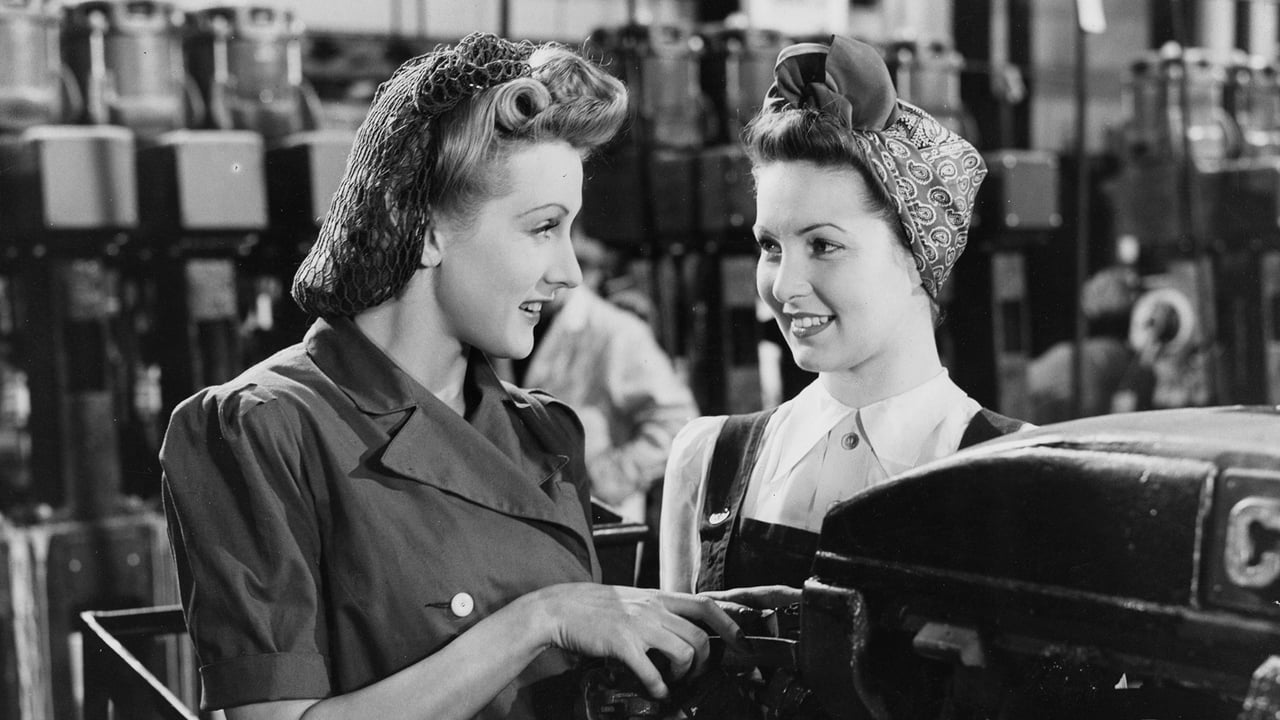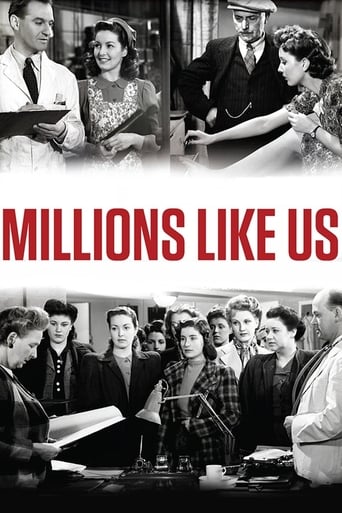

Millions Like Us (1943)This fast paced, light hearted and heartbreaking film about England during WWII starts great and gets better as it goes. The amazing thing, really, is that it was shot during the war and maintains a grim honesty as well as a necessary optimism. Hitler has to be defeated—but the movie makers, and all the actresses in their homespun honesty, did not know he would be.There are some who label this purely a propaganda war film, and that the gritty lack of romanticizing is part of preparing the populace for the overwhelming nature of the problem. And somehow in an hour and a half you really sense how a country could be turned inside out. The cheerful holiday at the shore that starts the movie turns to families being broken up, women having to work in factories, and eventually news of family members never to return, killed in action.The American documentary that comes to mind here is "Rosie the Riveter," about the enormous contributions of women in hard core industry (the poster to that shows a woman with a jackhammer). This is a fictional telling of the same idea, and it's far more enjoyable and in fact moving. (The poster for this film just shows a woman's face, with family members in the background—this is about the hearts and souls of the situation.)I don't think of this as a true "propaganda" film for some simple reasons (all of which make me like the movie more). Foremost, it's not a government sponsored or requested movie—it's not technically in service to some greater force (as propaganda really has to be). It does of course support the home cause, the war against Hitler, and it does so in a way that the audience will pay to see. That's the bottom line here—this is a really compelling romance about real people in a real contemporary world that the audience knows very well. There are countless people to relate to, and details to recognize. The love story aspects are not developed very well, but they are overflowing with sincerity.Wikipedia mentions that the movie was a "hit" in the USSR, which was also fighting Hitler. And the reason (to me) is simple: it's about regular people, the plight of the working class. There are few pretensions here (if any). And the filming is unusually tightly framed, by which I mean the compositions fill the frame, almost cramping the space on the screen, and it makes for a pleasure to watch, and makes for a lot to look at in every frame. And then the acting itself, without star power, is so straight forward and believable, even the slower moments make you pay attention.A great film in a vein very very different than, say, "Casablanca" in 1942 (which some people also label as propaganda!). And it came out the same year, and in a way had the same larger context, though beyond that there is nothing in common at all. The point being that this is a terrific film on many levels once you let go of the more polished, and more immediately impressive American films of the same time.
... View MoreI almost skipped this movie because I thought it was a documentary. It turned out to be a heartwarming and heartbreaking gem. My parents were kids living in Manhattan when the War broke out and my father turned 18 in 1944 and joined the Navy, telling us that he couldn't wait to get in it. They grew up in a neighborhood where everyone they knew signed up as soon as they became of age. The sacrifices that were given in order to support "our boys over there," rations, no meat and sugar, the joining of the various clubs and church organizations that sprung up to do "their share" were all very much the stories that I grew up hearing; all told without malice, but with a true sense of wanting to help, and proud to do it. "Bundles for Britain" was a saying I first heard from my father-in-law who spent 3 years in Africa with the Army. Seeing this movie gave me a genuine look (as it was filmed in 1943) of what exactly our Greatest Ally was enduring. While the ending was heartbreaking, it expressed, through a young woman's eyes, how the War effected everyone in different ways and how they changed from the beginning, middle and an end which was yet to be seen. A man I worked with told me, "I cannot describe to you the feelings of patriotism that swept through the country during the War." This movie showed the ultimate sacrifices, both willing and non-willing, that were made, and how "carrying on" is an expression that means just as much now as it did then and will serve in every aspect of our lives.
... View MoreI love Millions Like Us. My parents were in England during the war and while watching this it gives me an insight into what it would have been like for them during the war. As a child I watched a lot of movies of this era on television and when I watch these movies it takes me back to a safe and happy time sitting around our old black and white TV with my sister and parents. Both my parents are deceased now and watching these lovely movies makes me feel close to them. I also loved the fashions of this era. I loved the hairstyles, even the furnishing in the houses. This movie is a must for people who enjoy romances as well as drama. It is a movie that stands up today and the acting was excellent.
... View MoreYesterday evening Turner Classic Movies previewed "Millions Like Us," so it was the first time I saw the film. It may not be the best British wartime movie, but it is truly a gem in its own way. I was a child during the war, growing up in a small town in the Midwest of the U.S. Although I didn't have knowledge of what Britain was going through, I heard about it and knew how Americans reacted once we were in the war. The family interactions in "Millions Like Us" were totally believable...the family getting ready to go on holiday in the summer of 1939 and later the scene in the kitchen when Celia announces she has been called up.My father recruited workers in Missouri and Oklahoma for an ordinance plant during the war. Most of the workers he recruited--whom he personally put on trains headed north--were women who were happy to leave those depressed areas for higher pay, excitement and contribution to the war effort. Women were glad to go to work in factories, and in 1945 they were happy to give it up for marriage and so returning soldiers could have jobs. That's just the way it was then, and one can't put a different spin on how people behaved.I hope to see this film again.
... View More